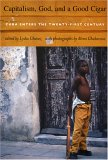
See larger photo
| Capitalism, God, and a Good Cigar: Cuba Enters the Twenty-first Century
     
[Click on the appropriate flag to buy the book] | Product Details
Paperback
264 pages
Duke University Press
Published 2005
Library Journal
"Without question, this is the most revealing book available on Cuba today. . . . Highly recommended."--This text refers to the Hardcover edition.
Jerry V. Haines, The Washington Post
"[For] people who want to see today's Cuba, vicariously and legally. . . . One cannot help but be inspired."--This text refers to the Hardcover edition.
Book Description
When the Soviet Union dissolved, so did the easy credit, cheap oil, and subsidies it had provided to Cuba. The bottom fell out of the Cuban economy, and many expected that Castro's revolution—the one that had inspired the left throughout Latin America and elsewhere—would soon be gone as well. More than a decade later, the revolution lives on, albeit in a modified form. Following the collapse of Soviet communism, Castro legalized the dollar, opened the island to tourism, and allowed foreign investment, small-scale private enterprise, and remittances from exiles in Miami. Capitalism, God, and a Good Cigar describes what the changes implemented since the early 1990s have meant for ordinary Cubans: for hotel workers, teachers, priests, factory workers, rap artists, writers, homemakers, and others.
Based on reporting by journalists, writers, and documentary filmmakers since 2001, the thirteen essays collected here each cover a particular dimension of contemporary Cuban society, revealing what it is like to have lived, for more than a decade, suspended between communism and capitalism. There are pieces on hip hop musicians, fiction writing and censorship, the state of ballet and the performing arts, and the role of computers and the Internet. Other essays address the shrinking yet still sizeable numbers of true believers in the promise of socialist revolution, the legendary cigar industry, the changing state of religion, the significance of the recent influx of money and people from Spain, and the tensions between recent Cuban emigrants and previous generations of exiles. Including more than seventy striking documentary photographs of Cuba's people, countryside, and city streets, this richly illustrated collection offers keen, even-handed insights into the abundant ironies of life in Cuba today.
Contributors. Juliana Barbassa, Ana Campoy, Mimi Chakarova, Lydia Chávez, John Coté, Julian Foley, Angel González, Megan Lardner, Ezequiel Minaya, Daniela Mohor, Archana Pyati, Alicia Roca, Olga R. Rodríguez, Bret Sigler, Annelise Wunderlich
From the Back Cover
“Capitalism, God, and a Good Cigar addresses in an original and insightful way the question so many have asked themselves for so long: how is it that Fidel Castro and his regime are approaching half a century in power under extremely adverse conditions, many of them of their own making? This book may not provide the answer, but it offers many answers, all of them intelligent and imaginative.”—Jorge Castañeda, Global Distinguished Professor of Politics and Latin American and Caribbean Studies at New York University and former foreign minister of Mexico
“Capitalism, God, and a Good Cigar is engagingly written, nuanced, and sensitive in political perspective, and innovative and broad-ranging in its choice of subject matter. This free-wheeling and intimate account of life in Cuba today gives a close-up view of the rapid-fire changes overtaking the island, from the new economy to Internet access to issues of freedom of speech to Cuban ballet. It provides a welcome, fresh perspective that goes far beyond what American audiences tend to hear about Cuba.”—Aviva Chomsky, Professor of History and Coordinator of Latin American Studies at Salem State College and coeditor of The Cuba Reader
About the Author
Lydia Ch·vez is an associate professor in the Graduate School of Journalism and Chair of the Executive Committee for the Center for Latin American Studies at the University of California, Berkeley. She is a former reporter for the New York Times in Latin America. |
|

